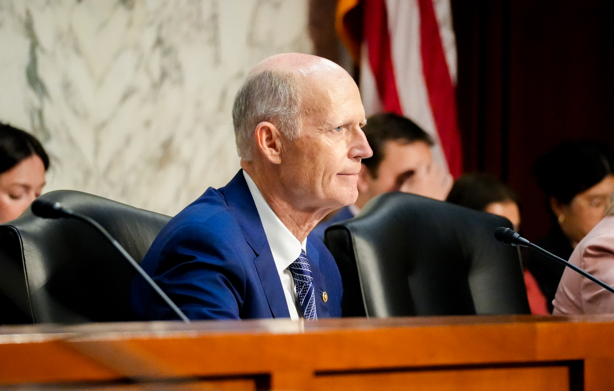VIDEO RELEASE Chairman Rick Scott Leads Aging Committee Hearing on America’s Vanishing Family Farms
WASHINGTON, D.C. – Yesterday, Senator Rick Scott, Chairman of the U.S. Senate Special Committee on Aging, convened a committee hearing focused on the critical issues facing America’s farm workforce entitled, “The Aging Farm Workforce: America’s Vanishing Family Farms.” The hearing addressed the growing challenges associated with the aging population of America’s farmers and the long-term impact on the nation's agricultural sector, as well as the urgent need to address the declining number of young people entering farming, and the economic and logistical hurdles facing older farmers as they look to transition their operations to the next generation. Throughout the hearing, Senator Scott emphasized the importance of strengthening support for family farms and safeguarding the future of American food production. America’s aging farmers, one-third of whom are over the age of 65 with a median age of 58 years old, constitute the nation’s oldest workforce.
Chairman Scott’s witnesses for the hearing included Zippy Duvall, President of the American Farm Bureau; Jim Alderman, Owner of Alderman Farms and the 2025 Florida Farmer of the Year; and Aaron Locker, Managing Director at Kincannon & Reed, who all shared best practices for succession planning, strategies to support older farmers nearing retirement, and ideas to promote long-term stability in the agriculture sector. Their testimonies offered critical perspectives on how to ensure family farms remain a vibrant and sustainable part of America’s economy.

Watch Chairman Scott’s full remarks HERE. Read Chairman Scott’s remarks as prepared for delivery below:
The U.S. Senate Special Committee on Aging will now come to order.
Today, we are gathered to discuss a very pressing issue, not just for our aging community, but for our country.
The U.S. is the breadbasket of the world, thanks largely to family farms. Unfortunately, the farming and agricultural workforce is aging and nearing retirement, and fewer and fewer young people are looking to take over their family’s farms or enter the agriculture industry.
With more farmers leaving the field and not having someone to pass their land and legacy on to, we face significant challenges to agricultural production, rural community sustainability, and U.S. food security.
Here’s why this matters: U.S. FOOD SECURITY IS NATIONAL SECURITY.
American farmers are the nation's oldest workforce, averaging 58 years old.
One-third of farmers and ranchers are over the age of 65. In my home state of Florida, that number is even higher, accounting for roughly 40% of all farmers.
This group of aging farmers owns over 40% of U.S. farmland. And with more farmers retiring and fewer children looking to take over farms for their families, these farms and their legacies are at risk.
The U.S. has lost more than 200,000 farms since 2007. That’s 40 million acres of land being repurposed for commercial, residential, or industrial development, and 40 million acres of land that are no longer producing food and agricultural products in and for the United States.
There are many factors that contribute to this loss. Most farmers aren’t looking to sell land to a developer. They’d prefer to keep their farm functional and to pass their hard-tilled land to onto someone who can continue their legacy and service to the country.
But more and more young people are turning away from jobs in farming and agriculture, due largely to the increased cost of farming, which is especially difficult for small farmers and those just starting out.
This next generation of farmers are facing increased regulatory burdens and operating costs. The national price for farmland has increased over 7% in three years, averaging $4,000 an acre. Over 80% of farmers work a second job.
Farmers face many challenges, from natural disasters to inflation. Rising input costs, especially high energy costs, make continuing in the family business less attractive to younger generations. This is also true when accounting for death, property, and inheritance taxes that can make taking over a family farm overwhelming.
New farmers face even steeper obstacles, including access to land. As older farmers retire, foreign and adversarial entities, like Communist China, look to gain a stronger toe hold in the U.S. agricultural sector by buying their land.
At this point, China owns more than 350,000 acres of farmland across 27 states. THAT IS AN UNACCEPTABLE THREAT.
American farmers also must deal with unfair trade practices undercutting their product on an international level.
Congress has not always done right by our farmers. The major legislative package aimed at supporting farmers and agricultural workers – the Farm Bill – hasn’t passed since 2018.
This is especially harmful for farmers who have suffered with rising prices for the last four years under the Biden administration.
While President Trump is having success in bringing down prices and fighting to support American farmers, he needs Congress to act as well and passing a good Farm Bill is the right place to start.
Otherwise, we will continue to use outdated information which compounds the harm done by other economic and regulatory factors. As a result, the burden increases on our aging farmers who want nothing more than to see their farm continue in trustworthy hands but are finding it harder and hard to find someone to carry on their legacy.
The aging farm workforce and the loss of family farms presents a critical challenge to the sustainability of American agriculture.
During this hearing, I hope to hear from our witnesses how we can better protect the heritage of our aging farmers and better secure the handover of farms to the next generation. We owe it to our retiring farm workforce to ensure their legacy can continued, while ensuring our food supply and shoring up the security of our nation.
Now I’d like to recognize Ranking Member Gillibrand for her opening statement.
###